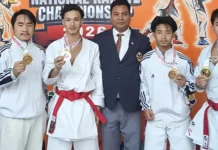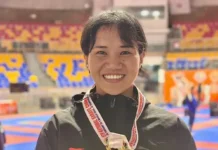[ Prem Taba ]
In a historic departure from its tradition, Rajiv Gandhi University (RGU) bore witness to its first-ever mass-scale student union election this year, on 21 September, marking a watershed moment in the dynamics of campus politics.
The Rajiv Gandhi University Students’ Union (RGUSU) election, which has traditionally seen unopposed leader selections, took a monumental leap towards a more democratic process, eliciting both praise and concern from the academic community.
In previous years, leadership positions within RGUSU were often secured through an electoral college system, wherein leaders were elected based on the preferences of a select group. The result was typically peaceful, and the elections ran smoothly. The democratic spirit remained intact even in this format. However, this year marked a turning point as mass participation became the order of the day.
One of the most prominent advantages of the mass-scale election is the triumph of democracy itself. It allows a broader cross-section of students to have their voices heard and actively participate in shaping the future of the university. This inclusivity is seen as a step in the right direction, fostering greater engagement and accountability among elected representatives. As the RGUSU election opens up to more candidates and participants, it also brings with it increased transparency and competition. This healthy rivalry can potentially lead to more capable leaders emerging to lead the student body.
However, with the dawn of mass-scale elections comes a set of challenges. The infrastructure required to support this expanded electoral process demands more significant financial resources and expenditures. Campaigning costs are likely to rise, and candidates will need to mobilise resources on a larger scale, potentially giving an advantage to candidates with deeper pockets. Students vying for positions must now grapple with fundraising, potentially excluding those with limited financial means.
Campaigning has also taken a more intense turn, with various student groups passionately advocating for their preferred candidates. This heightened enthusiasm may sometimes lead to clashes and emotional tensions among supporters.
Nabo Perme, a concerned student, noted, “While it’s great to see democracy in action, the intensity of the campaigns can create divides and rifts among friends and peers. This division can persist even after the election, further fragmenting the university community atmosphere.”
The aftermath of the election may leave the university community divided along the lines of winners and losers, potentially impacting the overall campus atmosphere. In contrast, the previous electoral college system involved fewer individuals and generally led to less collateral damage in terms of campus divisions.
Another factor contributing to this historic shift could be the perceived authoritative nature of the RGU administration under the leadership of Vice Chancellor Professor Saket Kushwaha. The administration’s strained relationship with students has been a subject of public discussion, potentially spurring the demand for a more democratic electoral process.
One significant concern raised during the RGUSU election process was the exclusion of research scholars from participating. All election-related notifications explicitly banned research scholars from contesting and voting, a move seen as a violation of the Lyngdoh Committee report guidelines. The Lyngdoh Committee report provides a framework for student union elections across India, emphasising the importance of inclusivity and fairness in the electoral process. The university’s decision to bar research scholars from participation raises questions about its commitment to following these guidelines.
“It’s essential for our university, which falls under the purview of the ministry of education and government of India, to adhere to the Lyngdoh Committee recommendations like other institutions in the country. Disregarding such norms may lead to future tensions and undermine the credibility of the institution,” stated a scholar.
“While we welcome a more competitive democratic process, the exclusion of research scholars is a blatant violation of established norms. We urge the university administration to reconsider its stance and ensure fair representation for all,” she added.
Notably, in the recent RGUSU election, Tagru Bhai emerged victorious in the presidential race, while Kigo Rakshap secured the position of general secretary, and Ravi Yangda was elected as the vice president. These election results signify the beginning of a new era in student politics at RGU.
The RGUSU’s first-ever mass-scale election marks a significant milestone in the history of the university, signifying a shift towards greater democracy in student politics. While it opens doors to increased participation and transparency, it also poses challenges in terms of resources and potential divisions among students. The exclusion of research scholars further raises questions about adherence to established guidelines. As the campus absorbs these changes, the academic community watches with a keen eye, hopeful that the university will find a balance that ensures that both democracy and unity prevail. (The contributor is a research scholar pursuing MPhil in the mass communication department of RGU.)


